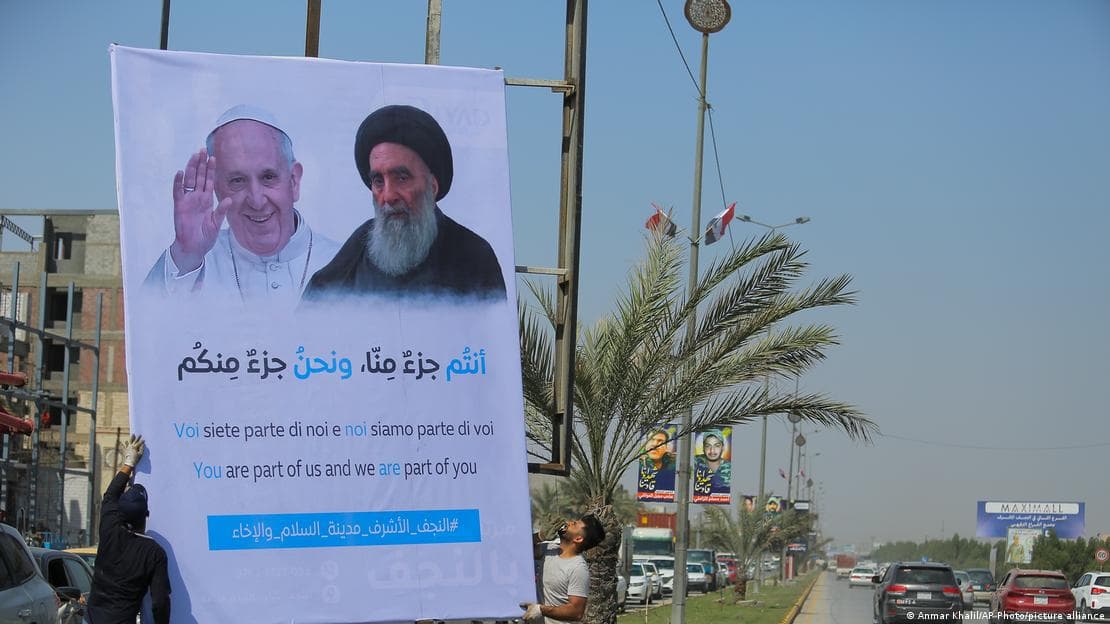ROME – In a recent letter to Iraq’s Grand Ayatollah Ali al-Sistani, the chief figure in Shia Islam, Pope Francis recalled their historic meeting two years ago and urged greater collaboration among their communities in promoting peace and basic human rights.
In the letter, dated Feb. 28 and delivered by Cardinal Miguel Ayuso Guixot, head of the Vatican Dicastery for Interreligious Dialogue, on March 9, the pope recalled their meeting, saying it “did good for my soul.”
“It was a milestone on the journey of interreligious dialogue and understanding between peoples,” he said, voicing gratitude for the conversation and “spiritual sharing” on topics such as solidarity, peace, and defense of the weak and fragile.
Francis called al-Sistani’s commitment to those who have suffered persecution, to preserving the sanctity of life, and to promoting the unity of the Iraqi people edifying.
“Collaboration and friendship among believers of different religions is indispensable in order to cultivate not only mutual esteem, but above all that harmony which contributes to the good of humanity, as the recent history of Iraq teaches us,” he said.
The pope insisted that their communities “can and must be a privileged place of communion and a symbol of peaceful coexistence” in which God as creator is invoked to bring unity on earth.
Pope Francis insisted that both he and al-Sistani are “convinced that respect for the dignity and rights of every person and every community, especially freedom of religion, thought, and expression, is a source of personal and social serenity and of harmony among peoples.”
To this end, he said it is up to religious leaders to encourage those with political and civil responsibility to work for “a culture based on justice and peace, promoting political actions that protect everyone’s fundamental rights.”
“It is essential that the human family rediscover the meaning of fraternity and mutual welcome, as a concrete response to today’s challenges,” the pope said, insisting that men and women of different religious confessions must nevertheless walk toward God together.
They are called to “meet in the enormous space of common spiritual, human and social values, and to invest this in the diffusion of the highest moral virtues, solicited by religions,” he said, quoting the Human Fraternity document signed in Abu Dhabi in 2019 by he and Sheikh Ahmed el-Tayeb, the grand imam of Al-Azhar, the Sunni university in Cairo.
He closed his letter voicing hope “that together, Christians and Muslims can always be witnesses of truth, love, and hope in a world marked by numerous conflicts and which is therefore in need of compassion and healing.”
Pope Francis and al-Sistani held a historic meeting in Najaf, the third holiest city in Shia Islam after Mecca and Medina, on March 6, 2021, during the pope’s official state visit to Iraq, marking the first time a pope had ever set foot in the country.
Sistani, 92, is head of the Iraqi religious seminary known as the Hawza, which is essentially a university and a church all at once.
Though al-Sistani has not been seen in public for years, he has had enormous influence over Iraq’s political life through his support or opposition to certain political leaders, and he had spent years under house arrest during Saddam Hussein reign.
In 2014, his fatwa played a key role in creating Shiite militia groups that fought against the Islamic State alongside the Iraqi army. In 2019, he gave a sermon that led to the resignation of then-Prime Minister Adil Abdul-Mahdi amid anti-government protests.
In a statement after he and Pope Francis’s historic meeting, the Vatican said that during 45-minute conversation, the pope stressed the importance of collaboration and friendship among different religious communities in order to promote the good of Iraq, the region, and all of humanity.
The Ayatollah’s office released its own statement, saying that during the meeting, the discussion focused on key global challenges, the role of God and his messages, and the need to commit to higher values to overcome current challenges.
Hours after their meeting, then-Iraqi Prime Minister Mustafa Al-Kadhimi announced March 6 as an official day of tolerance and coexistence in honor of the historic meeting.
RELATED: Iraqi minister declares national day in honor of Pope, al-Sistani meeting
The meeting, and the pope’s recent letter, are part of his broader strategy of building bridges with the Muslim community, engagement with which has been a cornerstone of his papacy.
In addition to his friendly relationship with el-Tayeb, Pope Francis has made visits to several majority-Muslim nations, further extending his outreach to the world of Islam last fall, making trips to Kazakhstan in September and to Bahrain in November of last year.
Follow Elise Ann Allen on Twitter: @eliseannallen











